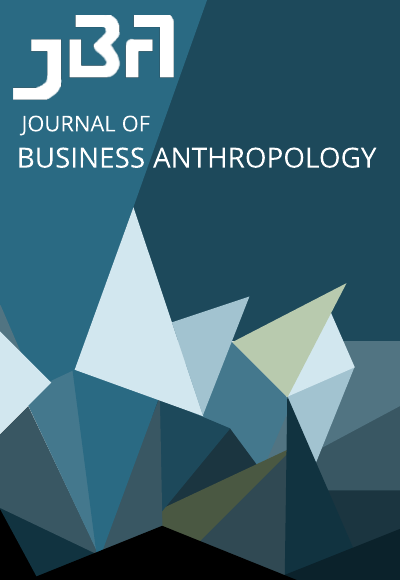Complicit Positioning: Anthropological Knowledge and Problems of ‘Studying Up’ for Ethnographer-Employees of Corporations
DOI:
https://doi.org/10.22439/jba.v6i1.5317Keywords:
Corporate ethnography, anthropology of business, positionality, ‘studying up’, ‘culture(s) of secrecy’, crisis of representation, complicity, para-ethnographyAbstract
Contemporary work by ‘corporate ethnographers’, as employees of businesses, offers a refreshing perspective on Anthropology’s ‘crisis of representation’ and its extensions—from neo-colonial concerns and reflexivity, to para-ethnographic and recursive approaches—that are increasingly characterized by complicit relations between ethnographers and their informants/‘collaborators’. This article focusses on the history and politics of ethnographers’ positionality in field research and the analytic products of, and audiences for, their work. It contrasts the often confounded labor of ‘anthropologists of business’ with that of ‘corporate ethnographers’, who work for businesses, while highlighting that, for both, the ‘studying up’ (Nader 1974 [1969]) methodology required for research at business sites disrupts assumptions surrounding the politics of traditional ethnographic fieldwork. Tracing shifts in core interests across general Anthropology, it is argued that close attention to new sitings and circumstances of fieldwork—including studying up in businesses—could productively drive reconsiderations of methodology, ethics and, therefore, epistemology in Anthropology.
In this context, corporate ethnographers, who are often formally trained in Anthropology, are specifically encouraged to analytically engage with the problematics of their perhaps-awkward complicities with their employers. It is suggested that, alongside the work of anthropologists of business, corporate ethnographers—should they choose to do so—are well-positioned to assist in exposing the black box of the culture(s) of secrecy through which the work of corporations intimately penetrates modern life.Downloads
Published
Issue
Section
License
Authors who publish with this journal agree to the following terms:
- Authors retain copyright and grant the journal right of first publication with the work simultaneously licensed under a Creative Commons Attribution License that allows others to share the work with an acknowledgement of the work's authorship and initial publication in this journal.
- Authors are able to enter into separate, additional contractual arrangements for the non-exclusive distribution of the journal's published version of the work (e.g., post it to an institutional repository or publish it in a book), with an acknowledgement of its initial publication in this journal.
- Authors are permitted and encouraged to post their work online (e.g., in institutional repositories or on their website) prior to and during the submission process, as it can lead to productive exchanges, as well as earlier and greater citation of published work (See The Effect of Open Access).



